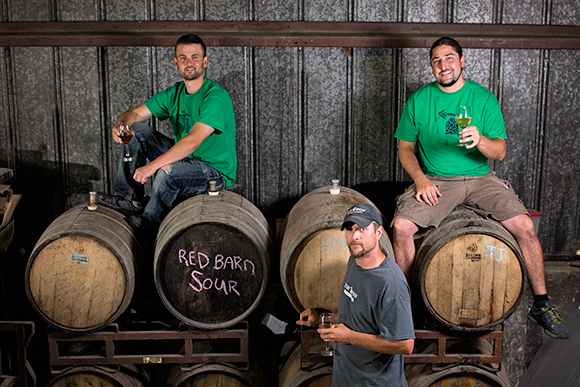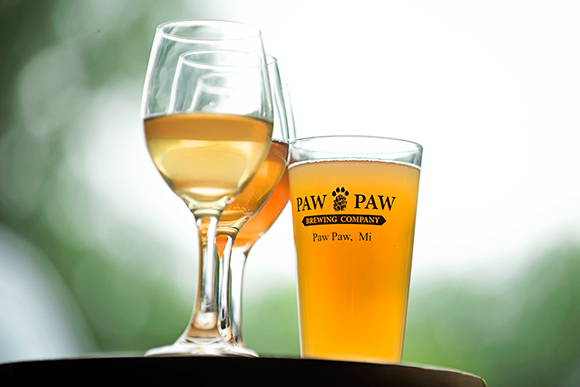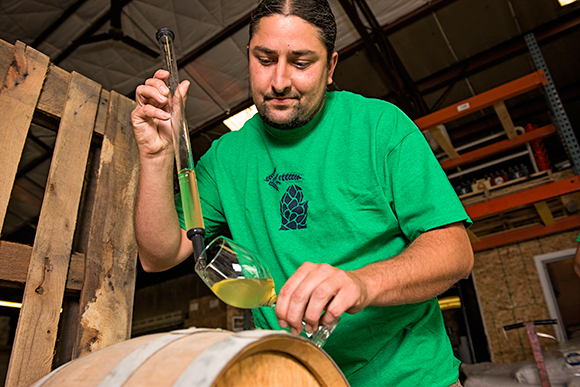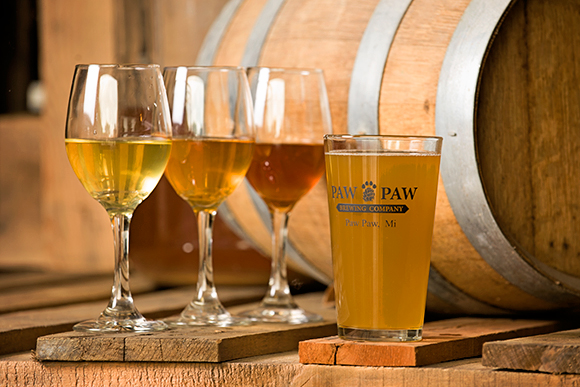Michigan mead makers turn simple recipe into complex tastes
An ancient drink is making a modern comeback. In a state that can't get enough craft brew, Mead is finding its own niche. Michigan is now one of the top producers of the drink that depends on bees.
Mead is known to many as a sweet honey wine with an alcohol content on par with spirits. But that only paints part of the picture. Mead is in fact a complex, highly adaptable, fermented beverage with a wide range of flavor profiles and characteristics.
“You can add spices, hops, all kinds of stuff. We do all kinds of meads,” Ben Fleckenstein of Paw Paw Brewing Company says.
Paw Paw Brewing regularly has two or more meads on draught, many of which only hint at the syrupy sweetness of the traditional style.
All of them, however, can be made using minimal and primarily locally produced ingredients. A simple mead can be produced with nothing more than honey, water and yeast.
Though meads can be a bit tougher to find than ciders or craft beer, those producing the beverage say they have no shortage of customers.
“When we have it on, people love it,” Fleckenstein says. “We do stuff with fruits and spices and everybody digs it. People who are traveling often come in and ask if we make mead.”
With that kind of popularity why isn’t everyone making mead?
The problem with mead is not lack of demand. It’s the high price of production. Honey is an expensive ingredient, and for small breweries like Paw Paw, finding space to create, keg, and bottle the beverage can be hard to come by.
“The great difficulty is that it’s just not that cheap to make,” says Bruce Grossman owner of Acoustic Draft Mead. “I don’t think you’ll ever see it get as big as cider or beer; it’s just not as affordable. Honey production is declining as bee colonies have begun to disappear.”
Acoustic, a Traverse City based meadery with a distribution network that extends across the state, has been producing several varieties of “small” mead since 2008.
“Small mead is an old term for ‘light,’ so it’s about 6 percent ABV. They’re easier to drink, have a tiny amount of carbonation like a cider would,” Grossman says. Acoustic Draft Mead is available in the Kalamazoo area at Beer and Skittles on Whites Road and at Salut Wine and Spirits on Gull Road.
Grossman, who initially intended to be a craft brewer and cider maker, produces nine varieties and often utilizes the fresh, seasonal fruits of the Grand Traverse region.
“I figured it was a market that was pretty wide open, and wanted to approach it from a brewer’s point of view, but I wanted something more quaffable, more thirst quenching,” Grossman says. “I think a lot of the people that drink beer or ciders are also mead drinkers. Mead gets made under a wine maker’s license but I think it’s the people enjoying craft beer that are more interested.”
While it doesn’t date quite as far back in the historical record as beer, mead nonetheless has been a commonly made beverage for centuries. The first recorded evidence of the drink dates to nearly 2000 B.C., though the origins of the drink may actually extend another few centuries back to Northern China.
Mead has grown up alongside beer as one of the staple fermented beverages consumed by cultures around the globe and brewers now are beginning to see the similarities in the two and the possibilities for experimentation with mead production.
Bell’s Brewing Company for example will occasionally have a mead on draught at the Eccentric Cafe and also released the honey wine as part of its 750ML bottle program in 2011.
Though Acoustic and Bell’s got involved with Mead intentionally, others like Paw Paw brewing were more or less handed the opportunity.
“One of the brewers that we have was really interested in it and pushed for us to venture forward a bit,” Fleckenstein says.
But if it wasn’t for the help of one of the brewery’s regular customers, Paw Paw’s mead production may have been a limited or one time affair.
“There’s this awesome gentlemen who comes to the pub with his whole family, he’s in here all the time,” Fleckenstien says, recalling a conversation that was taking place about mead production and the lack of high quality, affordable honey. “At some point he says ‘you know this is what my daughter does.'”
As it turns out, the customer’s daughter owns J & J Bee Service in Gobles and was more than happy to work out a deal with the brewery to supply the costly ingredient.
Despite the seemingly happenstance nature of Paw Paw’s mead production, Michigan with more mead-making businesses than any other state, has an entire mead industry that is thriving and beginning to spread, as events such as the Michigan Honey Festival and the Mead Cup prove.
The second annual Mead Cup takes place Sept. 27 in Frankenmuth and mead makers from across the state will bring their work to be judged in a variety of categories. There will be divisions for both commercial and amateur producers, as there was last year.
The competition is in conjunction with the third annual Michigan Honey Festival, created to educate people on the importance of preserving honey bees an on supporting the local honey industry.
The ancient drink that pleases modern tastebuds is being showcased by some very talented producers, so depending on the cost and availability of honey, the drink could become even more readily available for consumers.



















